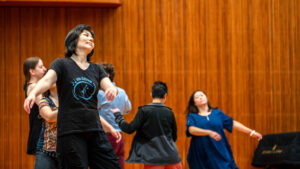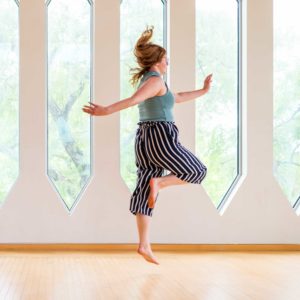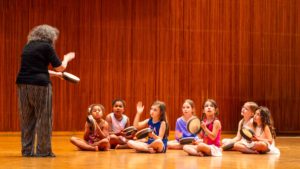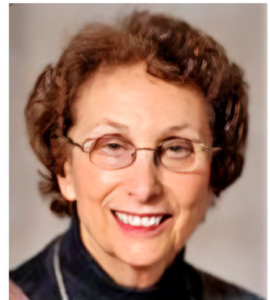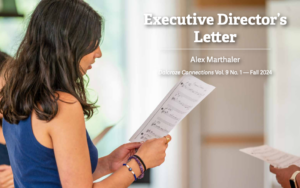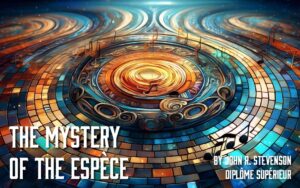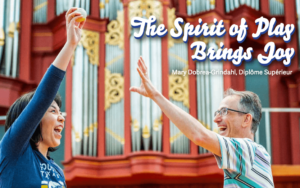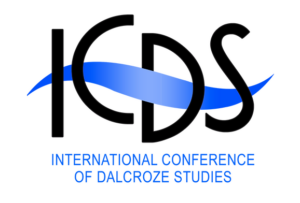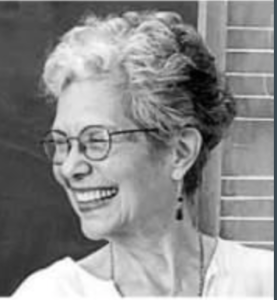Updates from the DEI Committee
Recently I attended a reunion of the k-8 school where I taught from its founding in 2005 until 2016. The Folk Arts-Cultural Treasures Charter School was founded by a group of primarily Asian American but also African American social justice activists and folk arts advocates. The vision of the school is to teach through a…
Read MoreQuick Reactions with a Dalcroze Teacher
This is the inaugural edition of “Quick Reactions with a Dalcroze Teacher”, a new regular feature of the DSA blog. Each month I’ll interview a different Dalcroze teacher. For the premier, I interviewed myself! Q: Give your “Dalcroze Origin Story” in 50 words or less. A: My girlfriend (now wife!) was taking classes with Bob…
Read MoreInspired by Dalcroze: Beginning a Teacher Training Journey
One day, I found myself interested in the question of how young children can grasp complex musical concepts at such an early age. My curiosity increased when I watched my four-year-old son, Arthur, engage with music in a way that was surprising and instinctive. He was not only listening to the music; he was fully…
Read MoreRemembering Annabelle Joseph
We learned this morning that Annabelle Joseph, our friend and colleague of many years, passed away last evening (11/19/24). Annabelle was an alumnus of Carnegie Tech (Piano Performance, 1953) and taught Eurhythmics and Solfège in the Carnegie Mellon University School of Music from 1989–2016 (27 years). She was the Director emerita of the Marta Sanchez…
Read MoreSabbatical in Switzerland: Institut Jaques-Dalcroze (Part 1)
This article first appeared in The Orff Echo, Volume XVIII, No. 4, Summer 1986. ©1986 American Orff-Schulwerk Association, Mayfield Heights, OH. Used by permission. Émile Jaques-Dalcroze, composer, pianist, and professor of harmony at the Conservatory of Geneva, developed his method of music education over an extended period from about 1900 to the 1920s. He was the greatest exponent…
Read MoreThe Mystery of the Espèce
Introduction Émile Jaques-Dalcroze used the term espèce (French for “species”) to describe all varieties of pitch sets, including dichords, trichords, and heptachords (among others), which outline and define all qualities of seventh chords. To understand the espèces requires a thorough understanding of the do-to-do scales, pitch sets (dyads, trichords, etc.), and the four species of…
Read MoreExecutive Director’s Letter
Welcome to an exciting new year with Dalcroze USA! Earlier this year, we joined together at our 2024 National Conference in Oberlin, OH, and are embracing the momentum it generated. This fall, as we welcome new members and newly inspired volunteers, I look forward to fresh ideas that will expand the reach and impact of…
Read MoreThe Spirit of Play Brings Joy
One summer afternoon, I sat on my porch watching some neighborhood children playing. Their mission was to find roly-polies under a rock, and they had to find a way to move the rock to do so. One pretended he was Superman and tried to lift it. Another tried to push it. The third kicked. Each…
Read MoreThe ICDS Heads to Luxembourg
The International Conference of Dalcroze Studies (ICDS), in its 11 years of existence, has blossomed into an exciting new major event in the Dalcroze world. It attracts Dalcroze, Dalcroze-adjacent and Dalcroze-curious participants from around the globe, enabling practitioners to mix fruitfully with world-renowned performers, clinicians, and scholars in fields from music education to neuroscience. Last…
Read MoreCall for Submissions: Remembering Anne Farber
It is with sadness that we announce the passing of Anne Farber from a heart attack on August 17, 2024. Many of us knew Anne through her brilliant teaching at the Longy School in Cambridge, along with Lisa Parker, and the Lucy Moses School in New York, where she founded the ongoing Dalcroze School. Although…
Read More